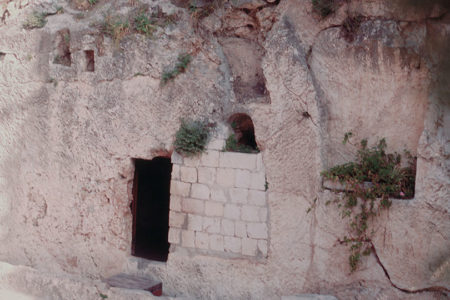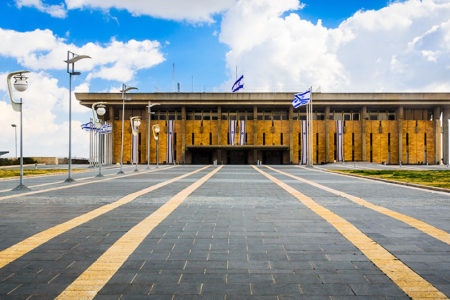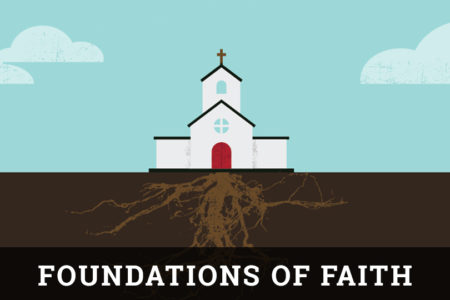The Peace Process
Is It Becoming a Bad Dream?
From a distance, which is where I sit, things don’t look promising for Israel. Frankly, I, along with hosts of Christians who are deeply committed to promoting Israel’s best interests, am confused and doing a considerable amount of head scratching these days. While we don’t make it part of our daily routine to question decisions made by Jerusalem, which is, of course, where decisions about the future of the nation should be made, and we realize that government leaders always possess information we do not, I can no longer ignore the gut feeling shared by virtually every true friend of Israel I meet these days. There are many questions grinding away at us, such as: Is Israel giving away the store in exchange for a fistful of paper that will be sent through the shredder the minute its adversaries get what they want? Are Israel’s enemies in the Arab world interpreting the concessions Israeli negotiators seem all too eager to make as a signal that embattled Jews have lost their taste for survival and are, therefore, biding their time as they gear up for another “throw them into the sea” campaign? Or, is Israel being sucked in by a slice-at-a-time strategy that will threaten the future security of the nation? These are fundamental questions that are being asked, I reiterate, by evangelical Christians, whom the late Menachem Begin once called one of Israel’s “two solid friends in the world,” the other being “some of our own people,” he said. Thus, in raising these questions we are not, by any stretch of the imagination, trying to discredit the Rabin government or throw monkey wrenches into the delicate gears of the peace process.
What Bible-Believing Christians Believe About the Bible
When it comes to Israel, Bible-believing Christians and Bible-believing Jews have little to argue about. Both believe that the Jewish people have a fundamental right to occupy their God-given homeland in the Middle East:
And the Lᴏʀᴅ said unto Abram, after Lot was separated from him, Lift up now thine eyes, and look from the place where thou art northward, and southward, and eastward, and westward, For all the land which thou seest, to thee will I give it, and to thy seed forever (Gen. 13:14–15).
Furthermore, under the Messiah, Israel’s ultimate destiny is to live in peace within greater Israel—a land spanning an area east and west from the little river of Egypt to the Euphrates:
In the same day the Lᴏʀᴅ made a covenant with Abram, saying, Unto thy seed have I given this land, from the river of Egypt unto the great river, the river Euphrates (15:18).
It should be noted that the “seed” receiving these covenant land promises was to come through Isaac, not Ishmael: “ … call his name Isaac: and I [God] will establish my covenant with him for an everlasting covenant, and with his seed after him” (17:19).
No one from our side of the line is arguing for an Israeli expansionist crusade that will create the promised greater Israel at the expense of its current neighbors. This will be accomplished by the Messiah under arrangements He dictates. What we do firmly believe, however, and fervently support is a Jewish homeland with defensible borders and the means to keep its enemies at a respectable distance.
Defensible Borders: Survival Through Strength
In America we are hearing a great deal about what the current Israeli and U.S. administrations feel must be achieved quickly in the Middle East to better position themselves for elections that will take place next year. Consequently, they reportedly feel that there must be some calculated risk taking—gambles, if you will. We know, of course, that for reasons to be discussed, any peace process with the type of adversaries faced by Israel is risky business. But need we be reminded that those who become addicted to high-stakes gambling almost inevitably lose it all? Therefore, when it comes to the survival of a nation, survival at the polls should not even be on the table.
The security of the State of Israel is the bottom-line issue in the quest for peace now being so hotly pursued on both sides of the Atlantic. All the talk about safeguarding the likes of Syria and Lebanon from Israeli expansionism would be laughable if it were not being taken so seriously by international peace brokers. To call expansionist and a threat to peace any nation that has taken land only in response to aggression and then, as in the case of Egypt, given it back to the aggressors, flies in the face of all laws of rational dialogue. No one concerned with stability in the region should be distracted by such talk. The only stability the Middle East will know, short- or long-term, will be predicated on Israel’s security and Israel’s security alone. Only when its neighbors become convinced, as Jordan apparently has, that Israel has the means, will, and backing it needs from the world’s only remaining superpower, not only to survive, but rain devastating retribution on those disposed to attempt to destroy it again, will substantive negotiations over subsidiary issues with fair concessions from both sides be attainable.
Words And Deeds
Short memories and coaxing people with bad intentions into saying what we want to hear can be extremely hazardous to our health. While it is much more difficult to understand why some Israelis might be tempted to do so, it is easily understood in the case of Americans. Our naiveté about the nature and objectives of some of Israel’s “peace partners,” in and out of Washington, is incredible. However, we must understand that we are, essentially—though this is somewhat strained in some quarters—a nation of optimists who are pluralistic, observe separation of church and state, and have no disposition toward killing and conquest in the name of religion. We are, therefore, willing to give almost everyone the benefit of a doubt—innocent until proven guilty beyond a reasonable doubt.
The Middle East, however, is a very different world, a world where ideologies of radical, religious Islamic elements run counter to Judeo-Christian perceptions of peace and good will.
Moshe Sharon, a professor of Islamic History at Hebrew University in Jerusalem, shed light on some fundamental issues in an article, “The Islamic Factor in Middle East Politics,” published in the January 1994 issue of the monthly magazine, Midstream. Sharon made a fascinating statement about Islamic “fundamentalism.” “ … the term ‘fundamentalism,’ so frequently bandied about in connection with contemporary Islamic activity, has, in fact, nothing to do with Islam.
“Fundamentalism emerges directly from the heart of Christian theology. The term applies to a religion based on belief in which the definitions of the articles of faith are essential for the salvation of each believer. The acceptance of the Bible as the true unchangeable words of God is the basis for the fundamental movements in Christianity. In Islam, however, such a problem does not exist. No Muslim who defines himself as a believer … would ever doubt that the Koran is the exact written representation of the Word of Allah.”
This perceptive statement effectively counters the current practice of much of the media and some politicians to constantly throw fundamental Christians—those who accept the Word of God as it is, for what it is—into the same pot with every radical terror group in the world. A friend in the Israeli Embassy in Washington once very forcefully corrected me on the matter. When I referred to Muslim terrorists as Islamic fundamentalists, he forcefully said, “No, Elwood, you should never refer to them as fundamentalists. Fundamentalists are biblically oriented Christians. These people are fanatical Islamic radicals, not fundamentalists!”
“Islam,” Sharon contends, “is a legal system, not a religious system based on articles of faith. A Muslim is not ‘saved’ because he believes in something; his religious credibility is defined by his adherence to Islamic practice … Islam does not differentiate between the two realms of the sacred and the secular, between politics and religion, between church and state.” The author goes on to say, “The inferior position of the Jew and the Christian is defined by Islamic law, which clearly prevents Jews and Christians from participating in the life of the Islamic state in parity with Sunni Muslims.” Therefore, talk of “the establishment of a ‘secular, democratic Palestinian Arab state’ in which Muslims, Christians, and Jews would share the same rights is a contradiction in terms.”
It would seem that the intransigence over the existence of Jewish settlements remaining in territories being ceded to the Arabs would bear this out. During a recent trip to Palestinian Jericho, I sensed from the looks of Palestinian police that this would never again be the Jericho we had known, even before Israel’s taking control of the area. We do not need special revelation to perceive that Jews will not be welcomed in Jericho, Gaza, or the West Bank once Palestinians have their state. Christian tourists will, in all likelihood, be tolerated for their currency deposits in the restaurants and gift shops and for what largesse showing a good face will bring from Western nations.
Another complicating factor is the revisionist propaganda that is convincing some historical illiterates in the Western world that Islamic people predated Jews in the Middle East and, therefore, qualify as displaced persons whose land was stolen by marauding descendants of Isaac. It is the same type of revisionism that is attempting to turn fantasy into history by contending that the Holocaust did not happen. In the revisionist” model, Syrians are reinvented as direct descendants of the Old Aramaeans. Iraqis, they say, sprang from the Summerians, Accadians, and Babylonians. Jordanians have been transformed into Moabites and Ammonites. Palestinians are shouting that they are the true heirs of the Amorites, Canaanites, and Jebusites from whom David wrested control of Jerusalem.
As if that were not enough, Islam, though third in line historically, regards itself as the first and only true religion and has rewritten history accordingly. For Islam, human history is regarded as Muslim history. Therefore, Adam has been made a Muslim prophet, along with Noah. Abraham was the forerunner of Mohammed and thus a great Muslim prophet. As a Muslim prophet, Moses received a revelation identical to the Koran. And, for good measure, David and Solomon have joined the ranks of Muslim prophets. Even Jesus was a Muslim prophet who produced a book like the Koran.
Is it any wonder then that Yasser Arafat, before 300 reporters in Geneva, Switzerland, a few years ago, claimed that Jesus Christ was a Palestinian freedom fighter who led a Palestinian revolt against the Romans? Ironically, those 300 reporters applauded his preposterous statement.
Moshe Sharon concluded his enlightening article with an observation that bears directly on fundamental elements in the peace process. “Islam does not rule out the possibility of a long period of truce with the enemy as part of its long-term policy of war. The enemy may understand such a truce as peace.” But in the Islamic scheme of things, “The only alibi for concluding a truce with the enemy, and de facto giving him a sort of legitimacy is when the enemy is too strong. Thus, a strong enemy is a necessary condition for concluding what amounts to peace with him; conversely, a weak enemy obliges the Muslim to renew the war against him.” However, in Islamic eyes, such peace agreements are only a postponement of what they see as the inevitable—the day when Jihad will be resumed and the enemy destroyed.
So, with all the talk of “peace in our time,” we must remember the things articulated above and listen to what the proponents of such revisionist history have said and are doing—words and deeds.
Saud ibn Abdul Aziz, King of Saudi Arabia, quoted from the American Press, January 9, 1954: “The Arab nations should sacrifice up to 10 million of their 50 million people, if necessary, to wipe out Israel … Israel to the Arab world is like a cancer to the human body; the only way of remedy is to uproot it, just like a cancer.”
Jamal Abdel Hamid Yussef, explaining the military wing of Hamas, said on February 15, 1995, “Our suicide operations are a message … that our people love death. Our goal is to die for the sake of God, and if we live, we want to humiliate Jews and trample on their heads.”
Yasser Arafat, from the Algiers Voice of Palestine, May 13, 1991, stated, “[W]e will continue our revolution and our resistance and our uprising until the banner of our revolution flies over holy Jerusalem and the walls of Jerusalem and the minarets of Jerusalem and the churches of Jerusalem.”
Again, Yasser Arafat, Johannesburg, South Africa, 1994, following his signing of the Peace Accord on the South Lawn of the White House, said, “Join me in a ‘Jihad’ [holy war] to liberate Jerusalem from the Jews.”
Salah Khalaf (Abu Iyad), in Al-Safir, said on January 25, 1988, “The establishment of an independent Palestinian state on the West Bank and Gaza Strip does not contradict our ultimate strategic aim, which is the establishment of a democratic state in the entire territory of Palestine, but rather is a step in that direction.”
Syrian President Hafez Assad on Radio Damascus, October 16, 1973, declared, “Our forces continue to pressure the enemy and will continue to strike at him until we recover the occupied territory [Golan Heights], and we will then continue until all the land is liberated.”
Today, this same Hafez Assad is hanging tough in his negotiations with Israel and the United States, and his policy to promise nothing and expect everything is delivering for the wily dictator. The more difficult he is, he seems to be promised more concessions. He has, thus far, made none of any substance. Despite Assad’s willingness to talk peace, he continues to collaborate with the Iranians and support terrorist organizations, namely, Lebanon’s Hezbollah. These people, he has said, are in fact, “patriots and militants who fight for the liberty and independence of their country … such people cannot be called terrorists.” It has been all but forgotten that these “freedom fighters” were responsible for taking Americans hostage and the 1983 bombings of the U.S. Embassy and Marine barracks, which cost 241 American lives. Their operations today continue from the Syrian controlled Bekaa Valley in Lebanon with a primary mission of killing innocent people in Northern Israeli settlements.
Currently, the drums are being beaten for the withdrawal of Israeli troops from the Southern Security Zone in Lebanon. Hezbollah will then, we are told, become benign, peace-loving citizens restoring the tranquility Israel and its Christian Southern Lebanese Army collaborators have taken from the area. Considering Assad and Hezbollah’s history, this scenario pushes the limits of credibility over the edge. It is more likely that the SLA and the hapless residents of the area will be forced to flee for their lives, and Northern Israel will again be subjected to unrelenting battering from Hezbollah Katyushas. Few seem to be taking into account that Syria has 40,000 troops stationed permanently in Lebanon and has never given up Syrian claims of sovereignty over that country.
Finally, Yasser Arafat has failed to be a trustworthy partner in the peace process. For starters, he steadfastly refuses to do what he promised when he signed on in Oslo and Washington—rescind the article in the Palestinian Covenant that is really the basis of the covenant and calls for the destruction of Israel. He also gives little more than lip service to punishing terrorists, as promised, and shutting down their operations from Gaza and Jericho. Of no little consequence to Israelis, who may be called upon to undo some unwise commitments in the future, is that Arafat is amassing a police force that will number roughly 30,000 once control of the West Bank is obtained. This was the number he said he needed to build an army to defend his Palestinian State against future aggressors.
With these considerations before us, and with the talk of the incomprehensible, such as Syrians once again perched above the Israeli settlements rimming the Galilee, becoming facts of everyday life for Israelis, is it surprising that some of us are beginning to wonder if the Peace Process is becoming a bad dream? Is it? Christian Zionists, like myself, who are viewing these events from a distance, would like to know.








